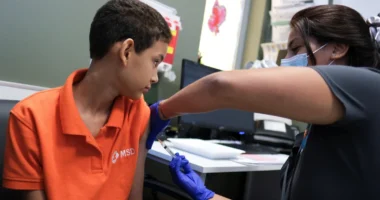As Argentina heads to the polls this Sunday to select its next president, voters confront not just a choice between two candidates, but a clash of divergent visions for the country’s future.
In Buenos Aires, the contest is between Sergio Massa, the current finance minister hailing from the political elite, and Javier Milei, a former TV commentator turned politician in the span of just 36 months.
This electoral runoff culminates a divisive campaign marked by unexpected turns, notably Milei’s earlier victory in a preliminary vote and a subsequent dip in the first round, followed by a recent surge in his polling numbers.
At the core of this heated race lies a critical question for the soccer-loving populace: which of these political antipodes, both former youth soccer goalkeepers, possesses the steady hands needed to navigate the country’s staggering inflation crisis?
Over 35 million Argentinians face the decision to trust Massa’s familiar policies, steeped in political history but plagued by past failures, or plunge into uncharted territory with Milei, who advocates replacing the Argentinian peso with the US dollar as the national currency.
Regulations prohibit publishing opinion polls within eight days of the vote, yet recent trends suggest a close contest, leaving analysts anticipating a tight election.
On a personal level, the contrast between the candidates is stark: Massa, a family-oriented figure, built his political career strategically, while Milei, living alone with five genetically identical cloned mastiffs, stormed into Congress on a wave of provocative political maneuvers.
It’s Milei, with his flamboyant style and radical proposals, garnering the most attention. His agenda, beyond the much-debated dollarization plan, calls for a rightward shift in Argentina. Measures include loosening gun control regulations, granting military control over the penitentiary system, and proposing private education support and health sector privatization.
While Milei’s ideas have sparked controversy, his proposal to completely dollarize Argentina’s economy is especially contentious. He argues that the country’s chronic inflation results from unchecked money printing by politicians, advocating the stability of the dollar as a solution.
The concept of dollarization, though not new, presents significant risks, including the loss of monetary control. Critics argue it restricts economic maneuverability, with concerns raised about Argentina’s insufficient dollar reserves to support such a transition.
Massa views dollarization as surrendering national sovereignty and emphasizes recent government actions showing a decrease in inflation, albeit remaining high at 142% year-on-year.
The global impact of this election is not lost, with endorsements from regional figures like Brazil’s Lula da Silva favoring Massa, while Milei earns support from Bolsonaro and other conservative leaders, underscoring the broader geopolitical implications of the outcome.
As the voting day approaches, anticipation builds not only for Argentina but for the world at large, awaiting the outcome that could shape political trajectories far beyond its borders.
As Argentina heads to the polls this Sunday to select its next president, voters confront not just a choice between two candidates, but a clash of divergent visions for the country’s future.
In Buenos Aires, the contest is between Sergio Massa, the current finance minister hailing from the political elite, and Javier Milei, a former TV commentator turned politician in the span of just 36 months.
This electoral runoff culminates a divisive campaign marked by unexpected turns, notably Milei’s earlier victory in a preliminary vote and a subsequent dip in the first round, followed by a recent surge in his polling numbers.
At the core of this heated race lies a critical question for the soccer-loving populace: which of these political antipodes, both former youth soccer goalkeepers, possesses the steady hands needed to navigate the country’s staggering inflation crisis?
Over 35 million Argentinians face the decision to trust Massa’s familiar policies, steeped in political history but plagued by past failures, or plunge into uncharted territory with Milei, who advocates replacing the Argentinian peso with the US dollar as the national currency.
Regulations prohibit publishing opinion polls within eight days of the vote, yet recent trends suggest a close contest, leaving analysts anticipating a tight election.
On a personal level, the contrast between the candidates is stark: Massa, a family-oriented figure, built his political career strategically, while Milei, living alone with five genetically identical cloned mastiffs, stormed into Congress on a wave of provocative political maneuvers.
It’s Milei, with his flamboyant style and radical proposals, garnering the most attention. His agenda, beyond the much-debated dollarization plan, calls for a rightward shift in Argentina. Measures include loosening gun control regulations, granting military control over the penitentiary system, and proposing private education support and health sector privatization.
While Milei’s ideas have sparked controversy, his proposal to completely dollarize Argentina’s economy is especially contentious. He argues that the country’s chronic inflation results from unchecked money printing by politicians, advocating the stability of the dollar as a solution.
The concept of dollarization, though not new, presents significant risks, including the loss of monetary control. Critics argue it restricts economic maneuverability, with concerns raised about Argentina’s insufficient dollar reserves to support such a transition.
Massa views dollarization as surrendering national sovereignty and emphasizes recent government actions showing a decrease in inflation, albeit remaining high at 142% year-on-year.
The global impact of this election is not lost, with endorsements from regional figures like Brazil’s Lula da Silva favoring Massa, while Milei earns support from Bolsonaro and other conservative leaders, underscoring the broader geopolitical implications of the outcome.
As the voting day approaches, anticipation builds not only for Argentina but for the world at large, awaiting the outcome that could shape political trajectories far beyond its borders.





